高二英语noun-clauses1
- 格式:pdf
- 大小:1016.51 KB
- 文档页数:9
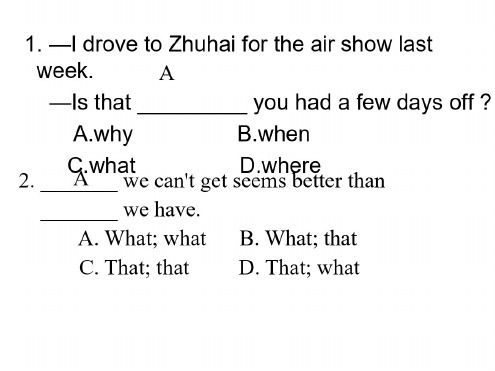
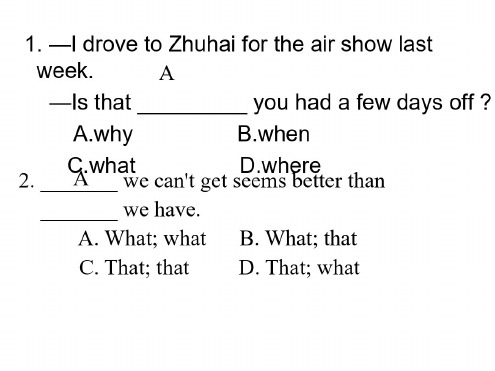

1.Jack bought a car.2.Ricky was a brilliant student and he passed the exam easily.3.John did not go to school yesterday since he was sick.4.James ran fast but he could not win the race because his start was late.Look at the second sentence. It contains two parts:★Ricky was a brilliant student.★He passed the exam easily.Now look at the third sentence, it too has two parts:★John did not go to school yesterday.★Since he was sick.Now look at the fourth sentence, it has 3 parts (or clauses):★James ran fast★He could not win the race★Because his start was late★Noun clauses★Adjective clauses★Adverb clauses1.I expect to win the race.2.I expect that I shall win the race.3.That you had met him before makes me surprised.1.The bag with a red apple logo is mine2. The bag which has a red apple logo is mine.1.John stopped working in the evening (When?)2.John stopped working when the evening came (When?)1.The subject of a verb.2.The object of a transitive verb.3.The object of a preposition.4.In apposition to a noun or pronoun.5.The complement of a verb of incomplete prediction.the subject of the verb:★How he could assist me was his concern.★Whether we can start next week seems uncertain.★That you did so surprises me.★What I said was true.★When he will return is uncertain.Why Anne hung herself is mystery.the object of a transitive verb:★Please tell me why you did this.★I do not know when she will return.★I cannot tell what has become of him.★I asked the man how old he was.★He says that he won’t leave.★I hoped that it was not true.★She denied that she met him yesterday.★Tell me where you like to live.★Nobody knows who he is.Ask if he is at office.the object of a preposition:★There were no complaints except that the start was bit too late.★Pay attention to what I am now going to say.★There is no meaning in what you said.In each of the following complex sentences, the noun clause is in apposition to a Noun or Pronoun:★You shall never forget this,that honesty is the best policy.★It was unfortunate that you were sick that day.★Her confession that you found the money in the street will not be believed.★His belief that some day he would succeed made him determined.It is feared that they will not return.the complement (ˈkɔmplimənt)of a verb of in complete predication:★Her constant belief was that the infant might live.★My wish is that I may please you.★His great fear is that he may not succeed.★My belief is that she will not come.★Life is what we make it.★This is where I live.after an intransitive verb construction:★The sick man was sure that he would recover someday.★The boy was afraid that he would fall down.★All of us are so keen that you should succeed.★They felt very sorry that they lost the match at the end.the conjunction that is omitted; as,I know (that) you did it.by a relative pronoun or by a relative adverb; as,★Uneasy lies the head that wears a crown.★He is the man whom we all respect.★The time when the boat leaves is not yet fixed.★The house where the accident occurred is nearby.The reason why I did it is obvious.I met Anne, who (=and he) gave me this letter.He is the boy who broke the window.is sometimes understood and omitted; as,★Drink all (that) you can.★I saw a girl (whom) I know.★Where is the food (which) he left for me?On the day (that) you pass the test I will give you a present.The infinitive with to is often used as the equivalent of an Adjective Clause★Give me some food which I may eat.Give me some food to eat.★He has no boots which he can wear.He has no boots to wear.★The doctor has given me medicine which I must take.The doctor has given me medicine to take.★I have work which I must do.I have work to do.★Strike the iron while it is hot.★You are taller than I thought.★He ran so quickly that he soon overtook me.★Adverb clauses of time★Adverb clauses of place★Adverb clauses of purpose★Adverb clauses of cause or reason★Adverb clauses of condition★Adverb clauses of result★Adverb clauses of comparison★Adverb clauses of supposition[ˌsʌpəˈziʃən] or concession★When you have finished your work you mayleave.★Don't talk loud while she is singing.★I will do it when I think fit.★They were commanded to wait till the signal was given.★He came after night had fallen.★Do it before you forget.★I have not been well since I returned from London.★There was silence as the leader spoke.★The doctor always comes whenever he is sent for.★The world always will be the same so long as men are men.★As soon as he heard the news he wrote to me.★Just as he entered the room the clock struck.★No sooner did he see us than he disappearedAdverb Clauses of Place are introduced by the subordinating conjunctions where and whereas,★I have put it where I can find again.★They can stay where they are.★Where you live I will live.★He led the caravan wherever he wanted to go.★Let him be arrested wherever he may be found.In order English whence and whither were also used to introduce an adverb clause of place:★Go quickly whence you came★The wind beloweth whether it listethAdverb clauses of purpose are introduced by the subordinating conjunctions so that, in order that, and lest. (In order that and lest are used in a formal style.)★I will give you a map so that you can find the way.★We eat so that we may live.★The UNO was formed in order that countries might discuss world problems better.★He was extra polite to his superiors lest something adverse should be written into his records.★Sleep not lest your Lord come in the night.The conjunction that occurred in older English:★He drew the sword that he might defendhimself.★Come hither that I may bless thee.Adverb clauses of cause or reason are introduced by the subordinating conjunctions because, as, since, that.★I am glad that you like it.★Since you are so clever you will be able to explain this.★He thinks, because he is rich, he can buy justice★Because I like you, I shall help you.★I did it because I wanted to.★I did not buy it because I did not like the look of it.★Since your father is not at home,I will ask you to take the message.★Since you swear to serve me faithfully, I will employ you.★He was very pleased that you have passed.Adverb clauses of condition are introduced by the subordinating conjunctions if, whether, unless.★Whether the Rajah gives him blows or money, he will speak the truth.★You must go whether you hear from him or not.★I shall forgive you o n condition that you do not repeat the offense.★If I like it, I shall buy it. Come if you wish to.★If it rains we shall stay at home.★If you have tears, prepare to shed them now.★Unless you work harder you will fail.★I can't pay it unless he sends me the bill again.Sometimes the subordinating conjunction is omitted in adverb clauses of condition; as,★Had I not seen this from my own eyes I would not have believed it.★Had I the wings of a bird I would fly away.★He would be happier were he honester★Were an angel to tell me such a thing of you, I would not believe it.★What would you answer did I ask you such a question?Adverb clauses of condition are sometimes introduced by arelative pronoun, or adjective, or adverb (without any antecedent); as,★Whichever road we take we shall be too late.★Whatever may be the result, I shall refuse.★Whatever happens keep calm.★Don't annoy him whatever you do.★However cleverly you may cheat, you will be found at last.Adverb clauses of result or consequence are introduced by the subordinating conjunction that. Frequently so or such precedes it in the principal clause.★He is such a good man that all respect him.★The Romans built in such a way that their walls are still standing.★He spoke in such a low voice that few could hear him.★So terrible a disease broke out that very few people survived.★Very heavy rain fell so that the rivers were soon in flood.★Laws were quickly passed so that this abusewas checked.★He behaved in such a manner that his reputation suffered.★So cold was it that many died.The Subordinating Conjunction that is often dropped in informal English.★He was so weak he could not speak.★I am so deaf I cannot hear thunder★It was so late I waited no longer★He is so old he can hardly walk★It was so small I could not see it.Adverb Clauses of Comparison are of two kinds:(i) Adverb Clauses of Comparison of Degree(ii) Adverb Clauses of Comparison of Manner Adverb clauses of comparison of degree are introduced by the subordinating conjunction than, or by the relative adverb as; as,★He is older than he looks.★No one can run faster than Rama.★It is later than I thought.★You must work harder than I do.★He is as stupid as he is lazy.★He is not so clever as you think.The verb of the adverb clause of comparison of degree is often understood and not expressed; as,★Nobody knows it better than I [do]★Few are better leaders than he [is]★You like curry better than I [like it]★It will happen as sure as death [is sure]★Not many know the truth of this better than you [know it]Adverb clauses of comparison of manner are introduced by the relative adverb as; as,★You may do as you please.★It all ended as I expected.★As you have made your bed so you must lie on it.★As he has lived so will he die.★As the twig is bent the branch will grow.Adverb Clauses Supposition or Concession are introduced by the Subordinating Conjunctions though, although, even if.★Though I am poor I am honest.★Though the heavens fall, justice must be done.★Though he slays me yet I will love him.★He set sail though the storm threatened.★Although troops had marched all day they fought bravely all night.★I shall be able to get in although I have no ticket.★Even if he is old he is able to do a great deal of work.★I would not do it even if you paid me.When mother asked how he got his leg injured, he replied that he met with an accident.The above sentence contains 3 dependent clauses:1.He replied. (Independent clause)2.When mother asked. (Adverb clause of timemodifying the verb, replied)3.He met with an accident. ()4.how he got his leg injured.( Noun clause being theobject of the verb, asked)Sometimes, a dependent clause can have another dependant clause within it. Let us see an example:I believe that he did not receive the letter which I sent last week.1.I believe. (Independent clause)2.That he did not receive the letter. (Noun clause,object of believe)3.Which I sent last week. (Adjective clause,modifying the noun, letter)Sentences may be more complex in the case of compound complex sentences where there may be several complex sentences joined by coordinating conjunctions.Let us see the below example:Police asked how he found the bag, but he refused to answer since he was scared.You will notice that there are two independent clauses joined together by but. Note that both independent clauses have dependent clauses.Let us see another example:Peter came to Anthony when he saw him at themarket, and he told him that he wished to come out of his debt by a marriage with a wealthy lady whom he loves, whose father has left her a profitable business.1.Peter came to Anthony. (Independent clause 1)2.When he saw him at the market. (Adverb clause oftime modifying came in Independent clause 1)3.He told him. (Independent clause 2)4.That he wished to come out of his debt by amarriage with a wealthy lady.(Noun clause, object of told of independent clause 2)5.Whom he loves. (Adjective clause, modifying ladyof Independent clause 2)6.Whose father has left her a profitable business.(Adjective clause, modifying ladyExerciseTry to analyze the clauses in the following examples:1.I regularly advised him that such business tacticswill not result in any profit for him but he never accepted my advice and he continued to follow the same which finally resulted in a huge loss for him.2.He was satisfied with the things he had and it willbe his pride and pleasure to hand down his business to hischildren as he received it from those who preceded him.3.With reluctance, she accepted the invitations of her old faithful friend, who once scolded her for refusing meat; but she said that he had become a vegetarian.4.I know a doctor with spiritual powers who can cure your illness although your doctor says it is incurable, but it is not possible to meet him immediately since there are thousands of patients are waiting to meet him, but you may give it a try.5.Whenever there is something that I don't know I tend to search on the internet but you need to know the reliability of the sites you browse since different sites are there for different purposes.6.The Police informed him that he needs to provide the correct information and if the information give is found to be untrue he will be sued in the Court where you may face sever punishments for providing false information.。
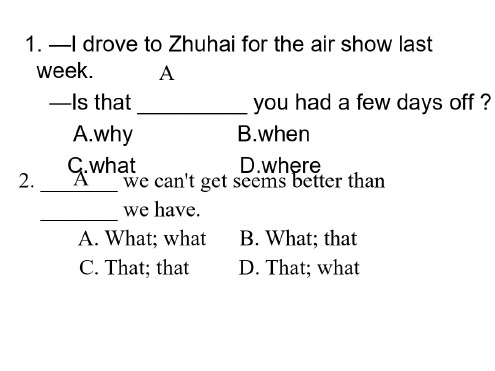
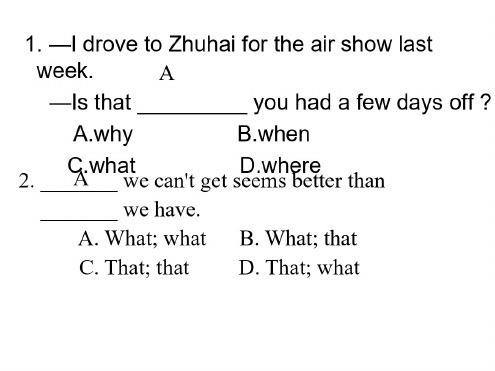
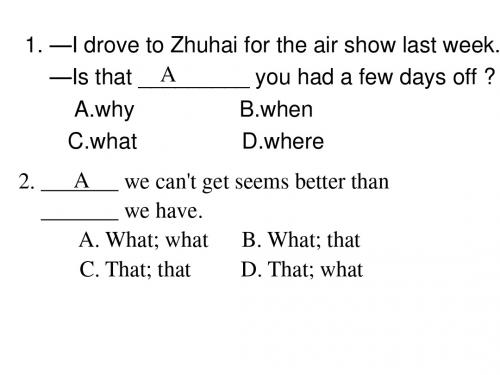
在句子中起名词作用的句子叫名词性从句(NounClauses)。
名词性从句的功能相当于名词词组,它在复合句中能担任主语、宾语、表语、同位语、介词宾语等,因此根据它在句中不同的语法功能,名词从句又可分别称为主语从句、宾语从句、表语从句和同位语从句。
一.主语从句主语从句是在复合句中充当主语的从句,通常放在主句谓语动词之前或由形式主语it代替,而本身放在句子末尾。
1.It作形式主语和it引导强调句的比较It it引导2.用it(1)Itis(2)Itis(3)Itis(4)It3.(1)if(2)Itissaid/reported…结构中的主语从句不可提前。
例如:正确表达:ItissaidthatPresidentJiangwillvisitourschoolnextweek.错误表达:ThatPresidentJiangwillvisitourschoolnextweekissaid.(3)Ithappens/occurs…结构中的主语从句不可提前。
例如:正确表达:Itoccurredtohimthathefailedintheexamination.错误表达:Thathefailedintheexaminationoccurredtohim.(4)Itdoesn’tmatterhow/whether…结构中的主语从句不可提前。
例如:正确表达:Itdoesn’tmatterwhetherheiswrongornot.错误表达:Whetherheiswrongornotdoesn’tmatter.(5)含主语从句的复合句是疑问句时,主语从句不可提前。
例如:正确表达:Isitlikelythatitwillrainintheevening?错误表达:Isthatwillrainintheeveninglikely?4.what与that在引导主语从句时的区别what引导主语从句时在句时在从句中充当句子成分,如主语.宾语.表语,而that则不然。